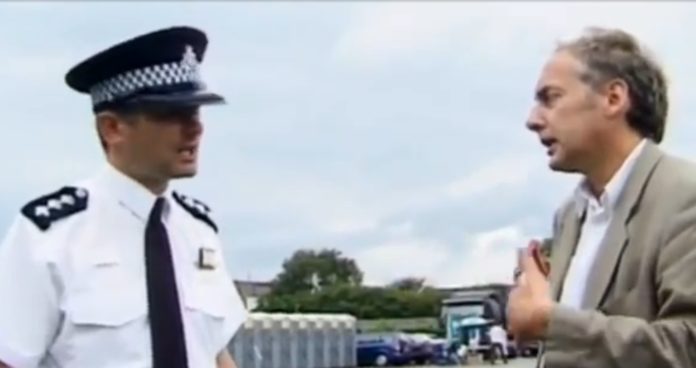- ‘Lies, damned lies etc…’ - 13th February 2026
- Missing in action - 12th February 2026
- Travel news again - 11th February 2026

During 23 years with the BBC, and 38 years in journalism (when he was trained to use clear and simple language, avoiding jargon), our Editor Phil Parry has (almost) become used to the extraordinary level of abuse he endures, especially when he questions murder convictions, but he has now become a victim of it once again after documentary films being broadcast today examine one of the biggest and most controversial investigations ever in the chequered history of South Wales Police (SWP), during which it has been responsible for a series of miscarriages of justice.

In the past he has described how he was helped to break into the South Wales Echo office car when he was a cub reporter, recalled his early career as a journalist, the importance of experience in the job, and making clear that the ‘calls’ to emergency services as well as court cases are central to any media operation.
He has also explored how poorly paid most journalism is when trainee reporters had to live in squalid flats, the vital role of expenses, and about one of his most important stories on the now-scrapped 53 year-old BBC Cymru Wales (BBC CW) TV Current Affairs series, Week In Week Out (WIWO), which won an award even after it was axed, long after his career really took off.

Phil has explained too how crucial it is actually to speak to people, the virtue of speed as well as accuracy, why knowledge of ‘history’ is vital, how certain material was removed from TV Current Affairs programmes when secret cameras had to be used, and some of those he has interviewed.
Earlier he disclosed why investigative journalism is needed now more than ever although others have different opinions, and how information from trusted sources is crucial at this time of crisis.
It has always seemed odd to me that when you do your job as a journalist, looking at the safety or otherwise of a murder conviction for example, you become the target of a sustained barrage of abuse.

It is almost as if the friends and loved ones of those killed (who have all my sympathy) want ANYONE convicted, even if it is the WRONG person!
Social media has, if anything, made the problem WORSE, not better, and it occurs to me that perhaps those people who hurl the insults are too much in the pockets of the police. However in the case of South Wales Police (SWP), this seems unwise as the force has been responsible for a string of miscarriage of justice cases, some of which I have uncovered.
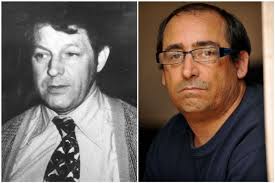
The list of these controversies is endless, and includes The Cardiff Three, The Cardiff Newsagent Three, The Darvell Brothers, The Tooze Murders, as well as The Annette Hewins Case.
This basic truth was emphasised for me by Sky documentary films on now, called ‘Murder in the Valleys’ (MITV), which re-examine the notorious murders in Clydach near Swansea, of two children, their mother and elderly disabled grandmother, who were all battered to death one night in 1999.
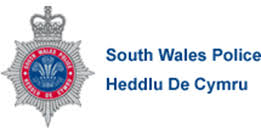
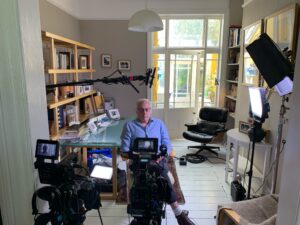
It was one of the biggest, and most controversial, investigations ever mounted by SWP, and there have been lingering doubts concerning the guilt of the man who was eventually convicted for those murders (following TWO trials), David (‘Dai’) Morris (who died in prison last year still protesting his innocence). I made a BBC Panorama about the remarkable case 20 years ago, and we were the first to question the safety of the conviction. Film-makers relied on that Panorama programme heavily for the four part Sky series about it, which is being transmitted at the moment. In MITV I am seen as I was then, engaged in secret filming, and as I am now talking about what happened all those years ago.
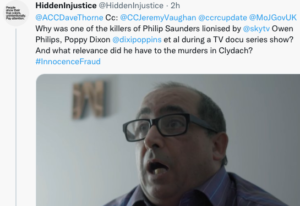 Michael O’Brien, one of The Cardiff Newsagent Three (whose conviction I had also questioned in ANOTHER programme), is shown saying why he believes this too is another miscarriage of justice case.
Michael O’Brien, one of The Cardiff Newsagent Three (whose conviction I had also questioned in ANOTHER programme), is shown saying why he believes this too is another miscarriage of justice case.
During filming for MITV, a forensic review found traces of DNA on a sock which it is believed was used to hold the murder weapon, that were “likely” to have come from Morris, and SWP trumpeted the finding. They effectively said: ‘We know we got it wrong in the past, but this time is different. Trust us’.

However ‘trusting them’ is difficult after all that has gone before, and there is a strong argument for scrapping SWP altogether, to start again.
The problems afflicting SWP bear comparison with those at the Metropolitan Police (The Met) in London (Britain’s biggest force), where the confidence of the public has plummeted following a series of scandals, and they have culminated in the abrupt resignation of the Commissioner, Dame Cressida Dick.
As I said in the opening of the BBC Panorama programme, looking at the safety of the Morris conviction in the Clydach murders case in 2002: “One police force in Britain has a disturbing record of locking up the wrong people in murder cases”.
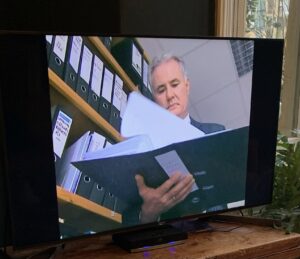
Meanwhile, the transmission today of the MITV films on NOW TV as a box-set and elsewhere, appears to have triggered once more, the poisonous comments I have long suffered (particularly on social media), and brought back disturbing memories of the years in which I have experienced them.
Although he WASN’T behind any of them, the Senior Investigating Officer in charge of the case at the time, Detective Superintendent (Retd.) Marti(y)n Lloyd Evans, does not come over well in MITV. We didn’t even bother approaching him for an interview in our original BBC Panorama, because we knew he’d say ‘no’. In fact SWP refused altogether to do a formal interview for us!
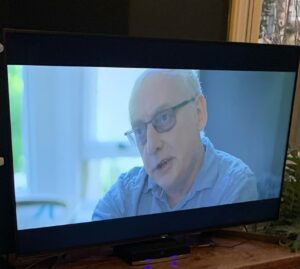
I used to spend most of my time, when I was in television, not undertaking journalistim at all, but in persuading people to go on camera (sometimes unsuccessfully). But it is MUCH easier when they are retired, as with MITV!
A highly credible witness saw someone wearing a black bomber jacket which looked like a police coat, near the murder scene in the small hours of the night in question, and gave a statement to officers, from which an ‘e-fit’ was constructed. The police report which was shown in the MITV documentary films (as well as in my BBC Panorama programme), said it had a ’90 per cent’ chance of likeness.
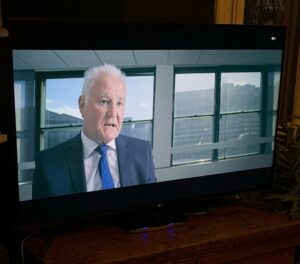
During MITV, Mr Evans is questioned about the apparent mistake of NOT releasing this e-fit to the public, and he replies that because the man was carrying a bag, and it was believed the killer had not had one, it was not put out. He said: “I didn’t think it was relevant”.
The e-fit matched almost exactly the face of the first senior police officer on the scene, Inspector Stuart Lewis, who (against all procedure) had only stayed there a matter of minutes, or that of his identical twin brother (another police officer, Sergeant Stephen Lewis, whose wife was having a gay affair with one of the victims). To say it wasn’t ‘relevant’ for the public to see the e-fit, I thought was bizarre in the extreme!

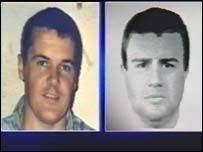
Inspector Stuart Lewis, had changed his shift to be on that night, but at crucial hours during the murders his whereabouts were unknown. He drove an unmarked police car which was similar to one spotted nearby, but with a log book which went missing, and he didn’t report the deaths as suspicious, even though he was known for meticulously playing by the book, and was called by his colleagues ‘Inspector Perfect’.
I am shown in one of the programmes confronting him with the e-fit during secret filming, and saying: “Now that is a very good likeness of Stephen, your twin brother or YOU…”
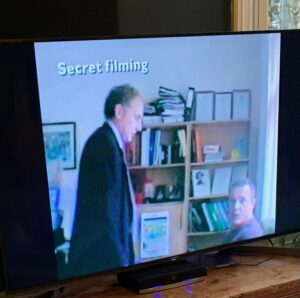
What was NOT transmitted, though, was that Inspector Stuart Lewis then said, flustered: “OR Morris”, to which I responded: “It doesn’t look like Morris to me…” My producer, Stephen Scott, asked on MITV: “Why weren’t you put on an identity parade?”, and Inspector Stuart Lewis replied, still flustered, that he should have been.
It is intriguing that in the statement transmitted by MITV programme-makers, he appeared to concentrate on himself, and how he had been unfairly treated by SWP in their botched Perverting The Course Of Justice case against him, but he might, perhaps, have been expected to name those who had been so terribly murdered. His proclamation began: “It is tragic that all involved in this high profile investigation were let down by the police…”.
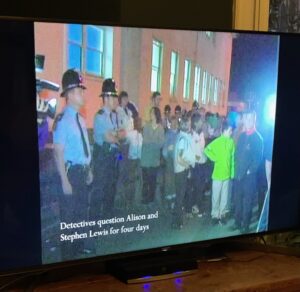
Quite apart from not releasing the e-fit which so closely resembled Mr Lewis, or his identical twin brother, other stupid (although rather less important) errors were also made. During the interview for MITV, Mr Evans came out with the word “sublime”, but clearly meant “subdued”!
Following transmission of the films in which that word was used, I have been called a “snake”, “spawn of the devil”, and my writing about the case condemned for catching “that side of you we have come to know so well”.
But comments like these fall into a familiar pattern.
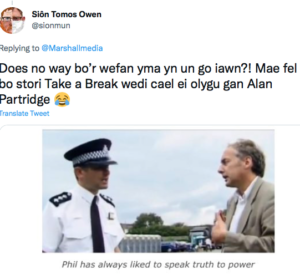
In the past my Wikipedia entry has been vandalised to include the words ‘tool’ and ‘knob head’, and I was compared on Twitter to the comedy broadcaster Alan Partridge. The Wikepedia entry has now been restored to its original form, after officials removed the abusive words.
The Alan Partridge comment was by a Sion Tomos Owen whose blog describes him as: “…a bilingual TV and Radio presenter, illustrator, writer and creative workshop tutor…”. Mr Owen said in Welsh: “There’s no way that this website (The Eye) is for real?! It’s as if a Take a Break (light magazine) story has been edited by Alan Partridge” (laughing emoji).

Even before the MITV films the abuse had been intense, with another remark concerning a television ‘reporter’ who had posted pictures of herself on Facebook (FB) or Twitter in skimpy clothes, typical of the insults I constantly receive: “Your article on Ellie Pitt was bordering on mysogynistic bullying, a really pathetic article written by a bitter individual who was a complete failiure as a BBC correspondent and also loved bashing the Catholic Church with your disgraceful Panorama programme”.
Indeed accusations of being ‘misogynistic’ (which is the correct spelling) or ‘misogynist’ are a constant refrain, if factual stories are published with the subjects happening to be women, yet these are potentially libellous words, and the description is provably wrong.

In the past I have also been accused online (incorrectly) of being a “bastard” (many times), an “anti-devolutionist wanker”, “pure scum”, a “liar” (also many times) a “little git”, and (correctly) a “nosey git”, “irritating”, or a “nuisance”. But these remarks come amid many others. Too many, in fact, to mention.
I rarely sue (although I do sometimes) unless the online message is particularly outrageous, and contains a libel (which most of them do). Some can be rebutted in court using an “honest comment” defence (formerly known as “fair comment”), however most cannot, which means that any libel case is likely to be successful.

The people behind these insults appear to be unaware of the legal ramifications of their statements, and say the most appalling things online (which, of course, have been PUBLISHED to a third party so the rules apply). It seems to be easier to make insulting remarks when a button is pressed, than it might be to consider what is being said, put pen to paper, and find a stamp, in order to send a letter.

Unfortunately this has all been stirred up again by documentary films which are on now, against a journalist who has the audacity to question a murder conviction by a Welsh police force which has a series of miscarriage of justice cases behind it.
That said, the MITV programmes are EXCELLENT, and should be watched. They are on SKY Crime and SKY Showcase tonight; with all four episodes available as a ‘box-set’ on NOW TV, and it has been written about extensively.

I am not “a snake” though, I’m only doing my job…
The memories of Phil’s decades long award-winning career in journalism (when online abuse was unusual at the beginning) as he was gripped by the rare neurological condition, Hereditary Spastic Paraplegia (HSP), have been released in a major book ‘A GOOD STORY’. Order it now!

Publication of another book, however, was refused, because it was to have included names.
Tomorrow – Phil explains why he has informed a Chinese state media organisation that he will no longer contribute to their programmes, as a report last month outlined how press freedom in the country was declining at ‘breakneck speed’.








